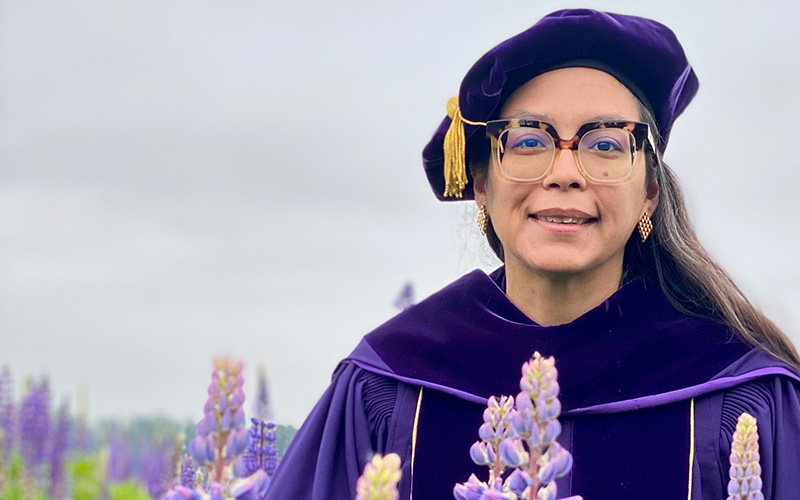
Working Toward Collective Justice
Star Berry has a trifecta at UW Tacoma, culminating in her doctoral studies that looked at how universities perceive and express the role of staff when working on issues of diversity, equity and inclusion.
Dr. Star Berry. Has a nice ring to it, doesn’t it? One can picture the newly minted doctor practicing her signature, trying out different iterations of the cursive “D” or maybe updating her email signature line to reflect her most recent achievement.
Berry recently completed her doctorate in educational leadership. The budding scholar is familiar with UW Tacoma’s graduation and hooding ceremonies. Berry earned a bachelor’s in politics and values (now Politics, Philosophy and Economics) as well as a Master of Arts in Interdisciplinary Studies.
Born in Tacoma, Berry grew up in Puyallup. After high school she enrolled at Tacoma Community College where she completed her associate’s degree. A first-generation transfer student, Berry originally chose UW Tacoma for the small class sizes and the campus’ proximity to home. “I received the kind of mentorship I needed as a first-generation student,” she said. “I am the first to experience higher education in my family. I didn’t have access to the educational wealth that comes from having a parent or grandparent who went to college.”
Berry is passionate about diversity, equity and inclusion, both in and out of the classroom. In some ways, her pursuit of education and advanced degrees can be seen as a way to better understand and address these issues. “I’ve utilized my degrees to work within immigrant rights, to work on communications for farm workers’ rights,” she said. “I’ve also been a labor organizer.”
The cultural teachings of Berry’s family helped her cultivate a sense of connectedness and a desire to give back. “I’ve used my education to give back to the community because that’s what I was taught,” she said. “Those teachings come from being Mexican and Indigenous.”
Berry’s master’s thesis focused on immigrant rights organizing within the Pacific Northwest. “I was looking at the concept of legality,” she said. “At the time there were a lot of conversations in the media about people being “illegal” and one of the things that is important to understand is that no one is illegal, and my thesis amplified those experiences.”
Berry is a student (well, until very recently), but she’s also a longtime staff member of the University of Washington. In her current position she works as a manager for the Nature and Health. “Nature and Health works on understanding the evidence behind time spent in nature and the benefits that this has across multiple populations,” she said.
For Berry’s doctoral dissertation she sought to “understand how staff within the university, particularly Indigenous, transgender and disabled staff, experience their workplace. Berry did her practicum at the UW’s Office of Minority Affairs and Diversity. “I worked with Rickey Hall and Jeanette James and they really taught me a lot,” she said. As part of her dissertation, Berry looked at different public university websites to get a sense of how these institutions were talking about staff as part of diversity, equity and inclusion.
This investigation of systems is baked into the curriculum within UW Tacoma’s School of Education Educational Leadership program. “One of the things the program prepared us for is how to understand complex systems in way that are culturally transformative,” said Berry. “I really want to give credit to Dr. Robin Minthorn who was my dissertation chair and the program’s director. The leaders she’s preparing are going to bring about benefits to society, because we’re thinking about education in a complex and critical way but also through multiple worldviews, so it’s not just western science, it’s also through Indigenous frameworks and Indigenous feminism.”
So, what’s next for Dr. Star Berry? Well, a much deserved break is part of her short-term plan. After that? “I’m going to continue managing Nature and Health which advances the evidence behind of the health benefits of time spent in nature,” she said. As for the long-term? “One of the things that I think is very important is intersectionality and collective justice,” she said. “That basically means that people with different interests and identities work together to improve their lives through transforming the inequities that persist, and that’s what I want to work on.”
Recent news
Main Content
Educated Palate
Main Content
Lawless Honored with Governor’s Student Civic Leadership Award
Main Content
Towards the Functional Characterization of All Human Genes
UW Tacoma in the News
Main Content
Minnesota adoptees respond to fraud reports in South Korean adoption programs
Main Content
What’s next for The Swiss? Upcoming workshop to tackle how to best use iconic site
Main Content
Local Leaders Recognized at UW Tacoma’s Business Leadership Awards
Contact Information
- Phone: 253-692-4430
- Email: uwted@uw.edu
- Education, School of (directory)



